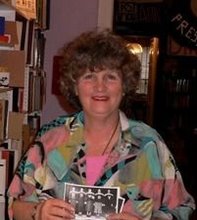Assassinations of those who represent change have marked my time in this moment of human history--Mahtama Gandhi, Dr Martin Luther King, Malcolm X, John Kennedy, Robert Kennedy, Salvatore Allende, Anna Politkiovskaya, Indira Gandi, Anwar al-Sadat, Yitzah Rabin and now Benazir Bhutto. Allende, my first experience with what some governments call "targeted assassinations," political erasure through the barrel of a gun or the belly of a plane, the determined campaign to break the spirit of a people and then, our invention of mass assassinations, called "ethnic cleansing," the whole century marked by some of us slaughtering large unwanted groups of other of us. The planet warms under us, as hot as our mutual antagonisms. Surely as a species, we have set a poor example. With all the god talk and supplications, we simply cannot stop killing each other. I do not mean that our cruelties are our biological destiny, but across this shattered globe, we have done our best to make sure that most of us have the least reason to pursue joy. Hunger, untreated illness, barricades of all kinds to protect profits of all kinds, borders just porous enough to let in cheap and desperate laborers, but sound-proofed against laughter. Oh Joan, there you go again, as so many of us do now--once the subject of Swift's broken heart is raised--man's inhumanity to man--we mourn the connection between the heart and mind, the litany of cruelties is too long and to know is to weep but then always, to act. And to act if one is a Russian or Iraqi journalist or an artist or a woman or a queer or a nonbeliever or a dissenter from the scripts of corporate and national power, is to court, for some, small assassinations and for others, the bullet in the head.
How expert we have become in building prisons, walls, check points, guard posts, interrogation cubicles, how frenzied our politicians rush to assure their constituencies that foreign workers are not really human, but aliens who must never under any circumstance be allowed the trappings of decency--keep them on their knees, in the shadows, on the edges, in the fields, under the machines of commerce, in the shiny kitchens, in the children's bedrooms, on the edge of their cots where they hug their stomach pains close because any revelation of their body's needs will stop the dollar from reaching their own desperate families. Perhaps I have just been away to long, perhaps I am not reading or hearing the right news, but it seems the more punishing the candidate promises to be, the louder the populace cheers. Perhaps because I have stood frozen at a border, my lover on one side and I on the other, waiting for the man in the uniform to make his decision about our future, I over relate to the border-stricken, or perhaps it is just empathy, an imagined knowledge of our human hearts.
On December 18, I read in the New York Times, "Gays Living in Shadows of New Iraq," by Cara Buckley and I had been reading of the Muslim women killed in newly "calm" provinces and of the Saudi Arabian woman who was raped and then ordered to receive lashes for her crime--an order which rescinded and the story of the man who took it upon himself to murder many women who worked as prostitutes and bury them in his backyard and all the other stories that tell us that many women all over this heated up earth are aliens, exiles from human care. ..."Being openly gay is not an option in the new Iraq, where the rise of religious extremism has left Mohammed and his gay friends feeling especially vilified." (Buckley) As I read Buckley's short article of this small moment in a huge national tragedy, I heard again Lepa's words, her question to me, "Joan, what happens to lesbians and gay people in wartime, to their desire?" What happens to women, undomesticated and well as wives and mothers during wartime, their desires? What happens to artists with all their quirky ways and unwanted visions during wartime? Oh my queer ones, you will find ways to hide as we have always done, you will pack away your colors and perfumes and strong clothing, your longings for love in the sun, and no Friedman or Brooks will write columns about your losses, but never again will I not see your face, your bodies in the war torn streets, I will look for you at the borders, in the cubicles, at the check points, against the walls of all governments; as my friend Allan Berube did, in wars of the past, telling your stories while others never saw you. On all sides where god talk reigns, we are the hunted ones.
"One night shortly after Saddam Hussein fell, American soldiers burst into the apartment that Mohammed shared with his two brothers. They were looking for insurgents, but took one look at Mohammed, with his long hair and shapely body wrapped in a robe, and teased him, he said.
'What are you, a lady man?' He remembered them barking. 'A Boy? Or a girl?' The turned to one of Mohammed's brothers, 'Who is this?' they asked, 'Your girlfriend?"
The news raced through Mohammed's building. 'All my neighbors came to know that I was gay,' he said. 'My brother said, Mohammed, leave the house; you can't live here anymore.'"
Thank you, Cara Buckley, for seeing a human story where no one else has.
Friday, December 28, 2007
Subscribe to:
Post Comments (Atom)

No comments:
Post a Comment